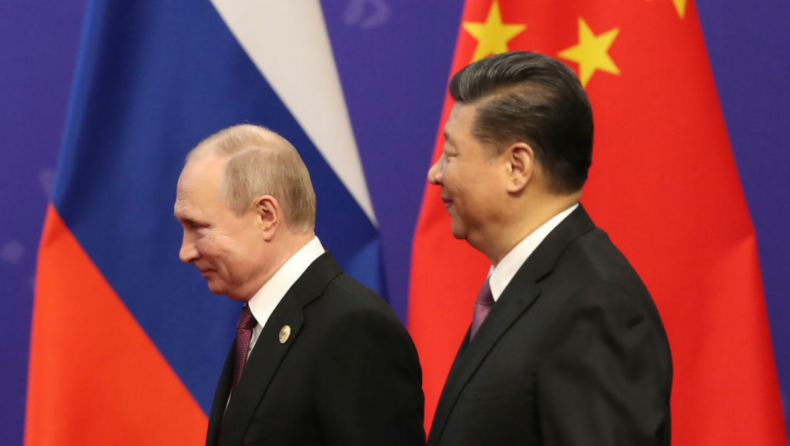Whether it is a trade war or an actual conflict like the one in Ukraine, China has demonstrated that it will do everything it can to keep its geopolitical disputes with the US from harming the domestic economy.
China’s support for Russia in Ukraine war is reaching its limits, as the domestic costs of for President Xi Jinping begin to outweigh the benefits of confronting the US.
A rapidly deteriorating Covid situation, along with the necessity of maintaining stability in a crucial year for Jinping, make it less likely that the Chinese leader will allow Putin’s invasion of Ukraine to have domestic repercussions.
Domestic pressure’s indications were clear Tuesday, as the United States’ warnings against China’s financial and military support for Russia heightened investor fears that the world’s two largest economies would decouple.
The Shanghai Composite Index plunged the most in two years, while an index of Hong Kong-listed Chinese shares fell 6.6 percent to its lowest level since 2008. In the last two days, a so-called fear index — akin to the VIX in the United States — has risen by 78 percent.
In this context, Foreign Minister Wang Yi informed his Spanish counterpart Jose Manuel Albares that Beijing sought to minimize more damage from the global financial turmoil caused by sanctions.
According to a Foreign Ministry readout of their talk, Wang stated Monday, “China is not a party directly involved in the situation, and it does not wish to be hurt by sanctions even more.”
In this backdrop, Chinese Foreign Minister Wang Yi told his Spanish counterpart Jose Manuel Albares that Beijing was working to limit the impact of the global financial instability brought on by sanctions.
“China is not a party directly involved in the problem, and it does not intend to be damaged by sanctions even more,” Wang said Monday, according to a Foreign Ministry readout of their conversation.
Even while Beijing seeks to accuse the US for beginning the war and its diplomats propagate Russian conspiracy theories about bio laboratories in Ukraine, China’s calls to de-escalate the situation persist.
Beijing’s measures appear premeditated to avoid becoming embroiled in a global confrontation or being driven further down economically while it seeks to resolve the problem.
The important question today is what decisions and actions China takes,” Singaporean Foreign Minister Vivian Balakrishnan said in an interview that will air during the forthcoming Bloomberg Live Asean Business Summit, adding that Beijing has “enormous influence” over Russia.
“If the global economy, supply networks, and technology become more bifurcated, this will be a very, very different world.” China’s envoy in Washington gave one of the clearest denials yet that Beijing had received any advance information of Russia’s conflict on Tuesday.
Ambassador Qin Gang wrote in the Washington Post that China had made heroic efforts to advocate for peace negotiations, and that threats from US officials that China would face consequences if it helped Russia avoid sanctions were unacceptable.
Assertions that China was aware of, consented to, or implicitly backed this conflict are false, he wrote. “Had China known about the impending catastrophe, we would have done everything we could to avoid it.”
China has already paid a price for failing to officially criticize Russia’s aggression against a sovereign nation. The conflict has drawn parallels between Putin’s efforts to restore what he considers to be lost areas and China’s own territorial claims to locations like Taiwan.
At least some of the recent market dips in China have been due to fears that Beijing may eventually move into Moscow’s camp, according to analysts.
“China is very cautiously hedging its bets,” said Alexander Gabuev, a senior fellow at the Carnegie Moscow Center and chair of the Russia in Asia-Pacific Program. “There’s this backing for Russian valid concerns about European security architecture and NATO criticism, but that’s also a way of saying American-led alliances is terrible.”
China’s calls to de-escalate the conflict are persistent, even as Beijing tries to blame the US for starting the war and its diplomats promote Russian conspiracy theories about bio laboratories in Ukraine.
Beijing’s tactics are calculated to avoid being drawn into a global conflict or being dragged further down economically while it tries to find a way out of the crisis.
Published By: Manan Khurana
Edited By: Khushi Thakur













